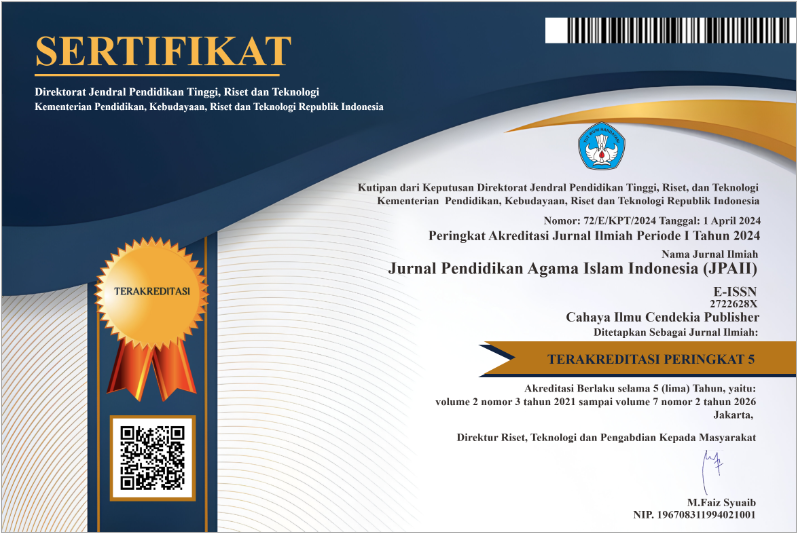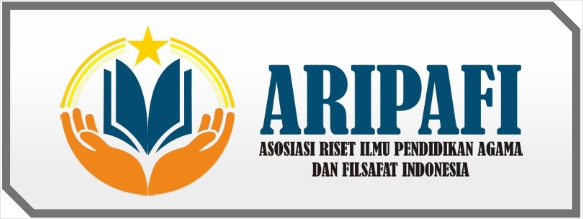Character Education in the Qur'an Surah Al-Isra' Verse 23: Study of the Value of Speaking Softly to Parents and Its Relevance in Modern Life
Abstract
Purpose of the study: Character education is very important for every child who is born, because children will be the successors of the older generation in building the future, both in the family environment and in society. This research aims to understand what kind of obedience a child should have and how to speak gently towards parents, even those who are older than him.
Methodology: This research method uses a qualitative method of literature study, which collects information from scientific papers and literature reviews, while the primary data are the Al-Qur'an and the translation of the Indonesian Ministry of Religion and the Tafsir Jalalain and the Tafsir Al-Mishbah, then the secondary data are in the form of books, journals, proceedings and scientific works related to character education.
Main Findings: The results of this study explain that character education, especially speaking softly to parents, is very important for children in the modern era. The Qur'an, Surah Al-Isra verse 23 provides educational values that are relevant to this day, namely direct commands from Allah SWT that must be obeyed, the prohibition of saying harsh words such as 'uff' to parents, and the recommendation to speak softly and politely to both parents.
Novelty/Originality of this study: This research has novelty in its approach which integrates the values of the Qur'an, especially Surah Al-Isra' verse 23, into the context of modern life in speaking softly to parents in forming the character of children who have noble morals amidst technological advances and socio-cultural changes.
References
D. Milla and I. W. Suastra, “Transformation of Philosophical Educational Values in Building the Character of the Future Generations,” Int. J. Adv. Technol. Soc. Sci., vol. 2, no. 12, pp. 1897–1906, 2024, doi: 10.59890/ijatss.v2i12.43
N. Shust, L. Tymchuk, I. Maidaniuk, I. Sydorenko, Y. Puzyrenko, and O. Nevmerzhytska, “Education as an Effective Component of Political Development and Socio-Economic Prosperity in Society,” Rev. Rom. Educ. Multidimens., vol. 14, no. 4, pp. 463–476, 2022, doi: 10.18662/rrem/14.4/651
M. Rahman, S. Indah Arifa Lubis, and D. Anggraini, Penanaman Nilai Agama dan Moral Anak Usia Dini dalam Pengasuhan Etnis Jawa dan Melayu. Medan, Indonesia: Penerbit Tahta Media, 2023.
S. Fatmala, “Peran Orang Tua Terhadap Pendidikan Karakter Anak Usia Dini,” Proc. UMSurabaya, vol. 1, no. 1, 2022.
E. R. Dewi and A. A. Alam, “Transformation model for character education of students,” Cypriot J. Educ. Sci., vol. 15, no. 5, pp. 1228–1237, 2020.
D. Ningrum, “Kemerosotan moral di kalangan remaja: Sebuah penelitian mengenai parenting styles dan pengajaran adab,” Unisia, vol. 37, no. 82, pp. 18–30, 2015.
K. Zaman, R. A. Afifah, and R. D. Oktavia, “Penafsiran Tentang Pendidikan Birr al-Walidayn dalam Surat Al-Isra’ Ayat 23-24,” Ta’wiluna: J. Ilmu Al-Qur'an, Tafsir dan Pemikiran Islam, vol. 3, no. 2, pp. 286–303, 2022, doi: 10.58401/takwiluna.v3i2.760
T. Suharto, A. Asmuni, and T. Anggraini, “Konsep Al-Qur'an sebagai Sumber Utama dalam Hukum Islam,” J. Multidisiplin Madani, vol. 2, no. 2, pp. 955–976, 2022, doi: 10.54259/mudima.v2i2.468
I. S. Dewi, “Bahasa Arab dan Urgensinya dalam Memahami al-Qur'an,” IAIN Tulungagung Research Collections, vol. 4, no. 1, pp. 67426, 2016, doi: 10.21274/kontem.2016.4.1.39-50
N. Saleh, Konsep pendidikan karakter dalam QS al-Isra’ayat 23-38: Telaah tafsir al-Misbah, Doctoral dissertation, Universitas Islam Negeri Maulana Malik Ibrahim, 2015.
M. Messy and C. Charles, “Pendidikan Karakter Dalam Al-Qur'an Surah Al-Isra Ayat 23-30 Menurut Tafsir Al-Azhar,” Innovative: J. Soc. Sci. Res., vol. 2, no. 1, pp. 472–482, 2022.
A. H. Rofi'ie, “Pendidikan karakter adalah sebuah keharusan,” WASKITA: J. Pendidik. Nilai Dan Pembangunan Karakter, vol. 1, no. 1, pp. 113–128, 2019, doi: 10.21776/ub.waskita.2017.001.01.7
F. F. Rosi and N. H. Asyihabi, “Birr al-wālidayn: Studi Komparatif Penafsiran Surah al-Isrā’ 23-24 Perspektif Ibn Kathīr dan M. Quraish Shihab,” J. Islamic Scriptures Non-Arabic Soc., vol. 1, no. 2, pp. 152–167, 2024, doi: 10.51214/jisnas.v1i2.941
M. Haris, “Pendidikan Islam Dalam Perspektif Prof. HM Arifin,” Ummul Qura, vol. 6, no. 2, pp. 1–19, 2015.
L. M. Fahri and L. A. H. Qusyairi, “Interaksi sosial dalam proses pembelajaran,” Palapa, vol. 7, no. 1, pp. 149–166, 2019, doi: 10.36088/palapa.v7i1.194
W. Syakhirul Alim and A. Zumru Diana, Pendidikan Karakter, 2021, https://www.researchgate.net/publication/349279262
N. Husna, “Strategi Guru PAI dalam Meningkatkan Kesadaran Siswa terhadap Kebersihan Diri di SMP Dharma Putra Medan,” Indones. Res. J. Educ., vol. 4, no. 4, pp. 287–292, 2024, doi: 10.31004/irje.v4i4.1065
A. Farid, “Literasi digital sebagai jalan penguatan pendidikan karakter di era Society 5.0,” Cetta: J. Ilmu Pendidik., vol. 6, no. 3, pp. 580–597, 2023, doi: 10.37329/cetta.v6i3.2603
S. Saihu, “Komunikasi Pendidik Terhadap Anak Berkebutuhan Khusus di Sekolah Khusus Asy-Syifa Larangan,” Andragogi: J. Pendidik. Islam Manaj. Pendidik. Islam, vol. 1, no. 3, pp. 418-440, 2019, doi: 10.36671/andragogi.v1i3.66
I. L. Lubis and M. Manshuruddin, “Implementasi Nilai Karakter Melalui Pendidikan Agama dan Kemuhammadiyahan di SMP Muhammadiyah 62 Tanjung Gusta Deli Serdang,” JIM: J. Ilmiah Mahasiswa Pendidik. Sejarah, vol. 8, no. 3, pp. 2413-2424, 2023, doi: 10.24815/jimps.v8i3.25818
A. Zohriah, R. Firdaos, A. F. Maulana, and G. Ramadhan, “Manajemen di Lembaga Pesantren,” J. Ilmiah Wahana Pendidik., vol. 11, no. 2.D, pp. 8-20, 2025.
T. Tumiran, B. Siregar, N. R. Agustia, and F. Azhari, “Implementasi Manajemen Pendidikan Berbasis Digitalisasi (Studi Kasus di Mas Tarbiyah Islamiyah Kec. Hamparan Perak Kabupaten Deli Serdang),” JIM: J. Ilmiah Mahasiswa Pendidik. Sejarah, vol. 9, no. 4, pp. 542-551, 2024, doi: 10.24815/jimps.v9i4.32899
M. Ridwan, A. M. Suhar, B. Ulum, and F. Muhammad, “Pentingnya penerapan literature review pada penelitian ilmiah,” J. Masohi, vol. 2, no. 1, pp. 42-51, 2021.
H. Astuti, “Berbakti kepada orang tua dalam ungkapan hadis,” J. Riset Agama, vol. 1, no. 1, pp. 45–58, 2021.
Y. Amalia, “Kajian Kitab Tafsir Al-Jalalain Karya Jalaluddin Al Mahalli dan Jalaluddin As-Suyuti,” AT-TAKLIM: J. Pendidik. Multidisiplin, vol. 2, no. 1, pp. 211–227, 2025, doi: 10.71282/at-taklim.v2i1.47
M. Quraish Shihab, Tafsir Al-Mishbah: Pesan, Kesan dan Keserasian Al-Qur’an. Jakarta: Lentera Hati, 2009.
D. Harmaisah, Nilai-Nilai Pendidikan Islam Dalam Al-Quran Surat Al-Israa’ (Kajian Surat Al-Israa’ Ayat 23–24), Doctoral dissertation, UIN Ar-Raniry, 2020.
W. Fimansyah, “Pengaruh pola asuh orang tua terhadap pembentukan karakter anak di era globalisasi,” Primary Educ. J. Silampari (PEJS), vol. 1, no. 1, pp. 1–6, 2019, doi: 10.31540/pejs.v1i1.305
R. P. Gulo and R. Gulo, “Education and Example: Implementation of Christian Education in Family in Era Society 5.0,” IJIS: Int. J. Integrative Sci., vol. 2, pp. 1067–1078, 2023, doi: 10.55927/ijis.v2i7.5210
K. P. Paramitha, “Panca Sraddha dan Keseimbangan Hidup: Keyakinan Hindu sebagai Panduan Moral dalam Kehidupan Sehari-hari di Yayasan Dana Punia Singaraja,” Swara Widya: J. Agama Hindu, vol. 5, no. 1, 2025.
M. Ishaque, “Islamic Family Ethics: A Pathway to Strengthening Social Harmony in The Modern Era,” Solo Int. Collab. Public. Soc. Sci. Humanit., vol. 3, no. 02, pp. 247–258, 2025.
Copyright (c) 2025 Syahdan Syahdan, Fuji Rahmadi P

This work is licensed under a Creative Commons Attribution 4.0 International License.
Authors who publish with this journal agree to the following terms:
- Authors retain copyright and acknowledge that the Jurnal Pendidikan Agama Islam Indonesia (JPAII) is the first publisher licensed under a Creative Commons Attribution 4.0 International License.
- Authors are able to enter into separate, additional contractual arrangements for the non-exclusive distribution of the journal's published version of the work (e.g., post it to an institutional repository or publish it in a book), with an acknowledgment of its initial publication in this journal.
- Authors are permitted and encouraged to post their work online (e.g., in institutional repositories or on their website) prior to and during the submission process, as it can lead to productive exchanges and earlier and greater citation of published work.







.png)
.png)





















